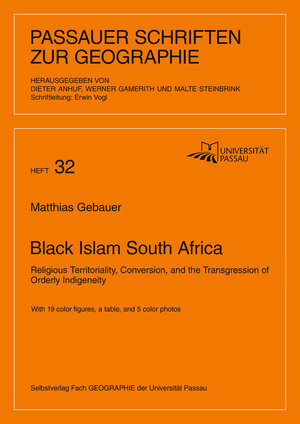Black Islam South Africa
Religious Territoriality, Conversion, and the Transgression of Orderly Indigeneity
von Matthias Gebauer, herausgegeben von Dieter Anhuf, Werner Gamerith und Malte SteinbrinkWith the history of colonialism, oppression and apartheid, the indigenous Afri can population of South Africa found itself socially and spatially ordered and profoundly kept in place by racist politics and practices of segregation and territorialization. Religion played a crucial role in the bringing about of colonial and most importantly apartheid domination, but also influenced resistance to oppression on individual and communal scales. Nevertheless, Christianity was increasingly perceived by a younger generation as the religion of the oppressor and therefore part of the racialized dialectic of social and spatial exclusivity and segregation. In this context, Islam became attractive as a revolutionary anti-colonial and anti-establishment religion as well as realm of everyday life with conversion to Islam working as a modus operandi of a self-determined Black and Muslim indigeneity. Not the historically situated Islam of South Africa, but Islamic ideologies emanating from the United States and Europe facilitated these socio-religious developments, offering connections to ideas and practices of a global, counter-hegemonic community and the bringing about of a Black Islam in South Africa.
This book is informed by an interdisciplinary perspective of cultural geography and Islamic studies and highlights how a racialized Black Islam has been invoked in order to reclaim authority over the religious and political scale of the African self. Building on qualitative research and the hermeneutics of religious Black Muslim ideology, it connects the struggle to belong within a post-colonial society to the utopia of a Black Muslim indigeneity as part of a global Black and Muslim community. It will be argued that South African Muslim Blackness is the result of global entanglements and circulations of anti-colonial ideologies with an Islamic framework and their subsequent translation into the realm of social and spatial orderings. The self of the African convert to Islam, culturally inscribed by racialized path dependencies and bodily ascribed by racist social realities, is translated into the Islamic counter-hegemonic narrative. Black Islam becomes a state of exception, a heterotopia to the everyday life, and makes transgression of persisting modes of social and spatial ordering possible.






